Simon Strange's Blog, page 2
May 13, 2015
Tools, Templates and Recommended Reading
Scrivener Templates The first is a download for a scrivener template based on the Nine Day Novel approach (there are links to his books in the recommended reading list), blended with the structural approach from Super Structure and Write Your Novel from the Middle by James Scott Bell. There's a style cheat sheet, a story bible index, and some other useful goodies including an ABC story plot driven chapter outline form for each chapter. An example of how to break chapters into scenes is given as well. Simon Strange's Nine Day Novel Scrivener Template (Hosted by Amazon Cloud Drive) To import, just open a new scrivener project, go to "Options" in the lower left hand corner of the dialog, and then go to 'import templates...'. Viola. Tools Scrivener - If you don't know about scrivener yet, then welcome to the new world of writing. If you do know but don't use it--you have no idea what you're missing. Available on Mac or Windows, the only things it lacks is an iPad app version and a plugin for ProWritingAid. Maybe that'll change. The versatility, organization, compilation capabilities, just EVERYTHING about this program is wonderful. ProWritingAid - I cannot recommend this enough. Even if you write in scrivener, the strength of this tool as a plugin for word (here's hoping a scrivener extension is eventually developed, that would be amazing!) means exporting your draft to a word document (as a whole or in parts) and then with a click having access to dozens of illuminating editing suggestions. There is also a plugin for use with Google Docs, but I like the word plugin better. There is also an upload/cut and paste version on the website. The single best self-editing software you can buy in my opinion, well worth the one-time cost. Go get this now. Books on Writing The problem most new writers have is that self-publishing is so easy! You can skip the normal requirement of a professional editor and put your first draft right up for sale. Unfortunately, this leads to a huge pile of poor writing from rushed writers trying to publish for volume instead of quality. You can have both, you just need to master the craft. These are books that transformed how I write each sentence, and how I plan and execute my books.
Sin and Syntax - Constance Hale
Rock Your Plot - Cathy Yardly
Nine Day Novel Writing, the Basics - Steve Windsor
Vex, Hex, Smash, Smooch - Constance Hale
Self-Editing for Fiction Writers - Rennie Brown and Dave King
Super Structure - James Scott Bell
Write Your Novel from the Middle - James Scott Bell
The Emotion Thesaurus - Angela Ackerman and Becca Puglisi
Sin and Syntax - Constance Hale
Rock Your Plot - Cathy Yardly
Nine Day Novel Writing, the Basics - Steve Windsor
Vex, Hex, Smash, Smooch - Constance Hale
Self-Editing for Fiction Writers - Rennie Brown and Dave King
Super Structure - James Scott Bell
Write Your Novel from the Middle - James Scott Bell
The Emotion Thesaurus - Angela Ackerman and Becca Puglisi
Published on May 13, 2015 19:57
Tools, Templates and Recommended Reading
Scrivener Templates The first is a download for a scrivener template based on the Nine Day Novel approach (there are links to his books in the recommended reading list), blended with the structural approach from Super Structure and Write Your Novel from the Middle by James Scott Bell. There's a style cheat sheet, a story bible index, and some other useful goodies including an ABC story plot driven chapter outline form for each chapter. An example of how to break chapters into scenes is given as well.
[image error]
simon_stranges_nine_day_novel_template.scrivtemplateFile Size: 273 kbFile Type: scrivtemplateDownload File To import, just open a new scrivener project, go to "Options" in the lower left hand corner of the dialog, and then go to 'import templates...'. Viola. Tools Scrivener - If you don't know about scrivener yet, then welcome to the new world of writing. If you do know but don't use it--you have no idea what you're missing. Available on Mac or Windows, the only things it lacks is an iPad app version and a plugin for ProWritingAid. Maybe that'll change. The versatility, organization, compilation capabilities, just EVERYTHING about this program is wonderful. ProWritingAid - I cannot recommend this enough. Even if you write in scrivener, the strength of this tool as a plugin for word (here's hoping a scrivener extension is eventually developed, that would be amazing!) means exporting your draft to a word document (as a whole or in parts) and then with a click having access to dozens of illuminating editing suggestions. There is also a plugin for use with Google Docs, but I like the word plugin better. There is also an upload/cut and paste version on the website. The single best self-editing software you can buy in my opinion, well worth the one-time cost. Go get this now. Books on Writing The problem most new writers have is that self-publishing is so easy! You can skip the normal requirement of a professional editor and put your first draft right up for sale. Unfortunately, this leads to a huge pile of poor writing from rushed writers trying to publish for volume instead of quality. You can have both, you just need to master the craft. These are books that transformed how I write each sentence, and how I plan and execute my books.
Sin and Syntax - Constance Hale
Rock Your Plot - Cathy Yardly
Nine Day Novel Writing, the Basics - Steve Windsor
Vex, Hex, Smash, Smooch - Constance Hale
Self-Editing for Fiction Writers - Rennie Brown and Dave King
Super Structure - James Scott Bell
Write Your Novel from the Middle - James Scott Bell
The Emotion Thesaurus - Angela Ackerman and Becca Puglisi
Sin and Syntax - Constance Hale
Rock Your Plot - Cathy Yardly
Nine Day Novel Writing, the Basics - Steve Windsor
Vex, Hex, Smash, Smooch - Constance Hale
Self-Editing for Fiction Writers - Rennie Brown and Dave King
Super Structure - James Scott Bell
Write Your Novel from the Middle - James Scott Bell
The Emotion Thesaurus - Angela Ackerman and Becca Puglisi
Published on May 13, 2015 14:25
May 12, 2015
On Storycraft: Part 2 - Building a Story Bible.
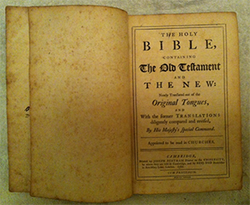 The Story Bible. The Canon of your novel, or especially a series (and, series fiction is the way to go for most fiction these days) lays down the commandments and arcana of your fictional world and should be started immediately after developing your awesome concept.
The Story Bible. The Canon of your novel, or especially a series (and, series fiction is the way to go for most fiction these days) lays down the commandments and arcana of your fictional world and should be started immediately after developing your awesome concept.There are lots of different ways to build a story bible, but my favorite is terribly disorganized and fabulously useful. If you're a stickler for proper organization in your work notes then that can be accomplished with a little elbow grease, and even give you a constant refresher on the ins and outs of your story world and the characters that populate it.
The concept has been ironed out and I'm pleased with what I have conceived. The very next step is to start a process of justification. The prime question here is: Why? Why does this story happen, why is this character at the center of it, why are the other people involved there to begin with, why are the stakes what they are? If your character, like Arthur, must assassinate a beloved senator, then you must answer the question "Why does someone want him dead in the first place?"
The universe may or may not have a divine being looking over everything with an inscrutable plan in mind, but your story absolutely does and the story bible is how you keep track of everything, justify your actions and choices in its creation. You're gong to start questioning everything: the why, who, what, when, where, and how of every aspect. Each question leads to more questions in a Socratic process of examination that will bring you a wealth of plot points and drivers, character backstory, and verisimilitude that will give credibility to your fictional world from the actions of the heroes to the monologues of your dastardly villains.
Let's keep working with the example developed in the first part of this series. "Arthur Collins didn't kill his children, but he's on death-row for their murder. When he's offered the chance at a new life, he sees the opportunity to seek vengeance and vindication for his children's death. All he has to do is kill Senator Paul Trask, a man lobbying for peace between the US and the middle east. However, when Arthur discovers a mysterious brass lamp in the Senator's home and learns of the powerful genie inside of it, he begins making wishes that not only threaten to cost him his own life, but the lives of millions of others."
There are mountains of questions to ask just from this concept blurb.
Who did kill Arthur's children if he didn't?Who offers him a chance to get off death row?Was this person or organization involved with the death of his children?Why does this agency want Arthur to kill the senator?If the senator has a genie in a bottle, has he made wishes before? What were those wishes?What were the consequences of those wishes?Where did the bottle come from in the first place? Who had it before the senator? What wishes have been made before?What wishes does Arthur make?Who else might be looking for the bottle?There's nine up front and there are many more where those came from. In answer each of these, inevitably new questions arise. I normally get out the first ten or so, answer them for myself, and then start asking questions about those answers. Sometimes, I'll give a question one or two alternative answers until I find one that I really like.
Example: First question: Who really killed Arthur's children? First answer: A man named Harvey Geissel, under the direction of a shady government organization. Why? Because of who Arthur is--not just anyone can command a genie; only people from certain bloodlines. Why? Because in the way back, it was a small cabal of Arabian sorcerers who captured and bottled the genies; only their descendants can compel a genie's power. Why did they bottle the genies? Good question...
I now have more questions! Who were the sorcerers? What kind of magic did they wield? What government organization? Why is it important to them that Arthur get his hands on the genie bottle? How did they convince Harvey Geissel to commit such an awful act of murder? Was he paid? Did he already know Arthur? What happened to him afterward?
When I enter this phase, I normally buy a new Moleskine notebook (or pull one off the stack of blank ones I collect from time to time; I buy them the way other people buy bread), label the front of it for the book/series, and then start asking and answering questions in its pages with a pen or pencil. You might prefer an e-Document of some sort. Recently I was playing around with scrivener links. One file has a list of questions, and the answers are spread out in individual files with answers; those answers are linked back to the questions so that a searchable index begins to develop. You can cross-link keywords as well; maybe you mention a particular character or setting in an answer, and want to link to information about that element - just make a new document file for it, highlight the keyword, and link it to the appropriate doc. (If you haven't already you need to be learning how to utilize scrivener, it is a marvelous tool for writers.) (Come to think of it, I may write a blog post about a bunch of nifty things you can do with scrivener.)
Ahem. As you answer questions you can organize them if you like into separate files or segments for characters, settings, foreshadowing, interior myths (that is, mythical elements interior to the story world), and so on. I like to peruse my growing story bible and mine for new questions and veins that offer richer material for scenes, shocking reveals, and so on.
The story bible is also where you'll establish the rules of the world. What kinds of wishes can our genie grant? How many does it grant? Is there any limit at all (of course there is, there should always be limits on magic or you won't end up with much conflict)? Where do genies come from? What other things exist, if they exist, and do they factor into the story at all? Are genies the only magic in the world? What is the nature of magic in this story? Is it limited, like oil, or a force, like gravity?
The purpose of the story bible is to give you a solid foundation that you can refer to as you build the plot, as well as get your creativity bubbling and boiling with ideas for where the story might go. Mine normally has snippets of dialogue, some creative description, ideas for later books if it's a series, and so on. All of this happens before the outline, but by the time I've got a little pocket note-book full of story errata, I have a much more complete sense of the story. It's beginning to come alive. Of course the whole bible isn't finished yet--that is a process that can potentially go on forever. It's world-building, myth-making, and story-prepping.
Exercise Time!
Take a good long look at your concept. Pick out at least two questions to start with about the main character, his circumstances, the event, and the consequences or stakes that your character is promised to face. It'll give you eight questions to start with. Answer these questions after you've written down all eight, and then begin the process of digging even deeper. If you hit a dead end, go back a few questions and start on another branch.
Published on May 12, 2015 19:46
On Storycraft: Part 2 - Building a Story Bible.
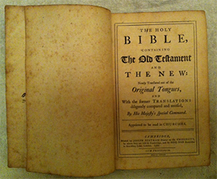 The Story Bible. The Canon of your novel, or especially a series (and, series fiction is the way to go for most fiction these days) lays down the commandments and arcana of your fictional world and should be started immediately after developing your awesome concept.
The Story Bible. The Canon of your novel, or especially a series (and, series fiction is the way to go for most fiction these days) lays down the commandments and arcana of your fictional world and should be started immediately after developing your awesome concept.There are lots of different ways to build a story bible, but my favorite is terribly disorganized and fabulously useful. If you're a stickler for proper organization in your work notes then that can be accomplished with a little elbow grease, and even give you a constant refresher on the ins and outs of your story world and the characters that populate it.
The concept has been ironed out and I'm pleased with what I have conceived. The very next step is to start a process of justification. The prime question here is: Why? Why does this story happen, why is this character at the center of it, why are the other people involved there to begin with, why are the stakes what they are? If your character, like Arthur, must assassinate a beloved senator, then you must answer the question "Why does someone want him dead in the first place?"
The universe may or may not have a divine being looking over everything with an inscrutable plan in mind, but your story absolutely does and the story bible is how you keep track of everything, justify your actions and choices in its creation. You're gong to start questioning everything: the why, who, what, when, where, and how of every aspect. Each question leads to more questions in a Socratic process of examination that will bring you a wealth of plot points and drivers, character backstory, and verisimilitude that will give credibility to your fictional world from the actions of the heroes to the monologues of your dastardly villains.
Let's keep working with the example developed in the first part of this series. "Arthur Collins didn't kill his children, but he's on death-row for their murder. When he's offered the chance at a new life, he sees the opportunity to seek vengeance and vindication for his children's death. All he has to do is kill Senator Paul Trask, a man lobbying for peace between the US and the middle east. However, when Arthur discovers a mysterious brass lamp in the Senator's home and learns of the powerful genie inside of it, he begins making wishes that not only threaten to cost him his own life, but the lives of millions of others."
There are mountains of questions to ask just from this concept blurb.
Who did kill Arthur's children if he didn't?Who offers him a chance to get off death row?Was this person or organization involved with the death of his children?Why does this agency want Arthur to kill the senator?If the senator has a genie in a bottle, has he made wishes before? What were those wishes?What were the consequences of those wishes?Where did the bottle come from in the first place? Who had it before the senator? What wishes have been made before?What wishes does Arthur make?Who else might be looking for the bottle?There's nine up front and there are many more where those came from. In answer each of these, inevitably new questions arise. I normally get out the first ten or so, answer them for myself, and then start asking questions about those answers. Sometimes, I'll give a question one or two alternative answers until I find one that I really like.
Example: First question: Who really killed Arthur's children? First answer: A man named Harvey Geissel, under the direction of a shady government organization. Why? Because of who Arthur is--not just anyone can command a genie; only people from certain bloodlines. Why? Because in the way back, it was a small cabal of Arabian sorcerers who captured and bottled the genies; only their descendants can compel a genie's power. Why did they bottle the genies? Good question...
I now have more questions! Who were the sorcerers? What kind of magic did they wield? What government organization? Why is it important to them that Arthur get his hands on the genie bottle? How did they convince Harvey Geissel to commit such an awful act of murder? Was he paid? Did he already know Arthur? What happened to him afterward?
When I enter this phase, I normally buy a new Moleskine notebook (or pull one off the stack of blank ones I collect from time to time; I buy them the way other people buy bread), label the front of it for the book/series, and then start asking and answering questions in its pages with a pen or pencil. You might prefer an e-Document of some sort. Recently I was playing around with scrivener links. One file has a list of questions, and the answers are spread out in individual files with answers; those answers are linked back to the questions so that a searchable index begins to develop. You can cross-link keywords as well; maybe you mention a particular character or setting in an answer, and want to link to information about that element - just make a new document file for it, highlight the keyword, and link it to the appropriate doc. (If you haven't already you need to be learning how to utilize scrivener, it is a marvelous tool for writers.) (Come to think of it, I may write a blog post about a bunch of nifty things you can do with scrivener.)
Ahem. As you answer questions you can organize them if you like into separate files or segments for characters, settings, foreshadowing, interior myths (that is, mythical elements interior to the story world), and so on. I like to peruse my growing story bible and mine for new questions and veins that offer richer material for scenes, shocking reveals, and so on.
The story bible is also where you'll establish the rules of the world. What kinds of wishes can our genie grant? How many does it grant? Is there any limit at all (of course there is, there should always be limits on magic or you won't end up with much conflict)? Where do genies come from? What other things exist, if they exist, and do they factor into the story at all? Are genies the only magic in the world? What is the nature of magic in this story? Is it limited, like oil, or a force, like gravity?
The purpose of the story bible is to give you a solid foundation that you can refer to as you build the plot, as well as get your creativity bubbling and boiling with ideas for where the story might go. Mine normally has snippets of dialogue, some creative description, ideas for later books if it's a series, and so on. All of this happens before the outline, but by the time I've got a little pocket note-book full of story errata, I have a much more complete sense of the story. It's beginning to come alive. Of course the whole bible isn't finished yet--that is a process that can potentially go on forever. It's world-building, myth-making, and story-prepping.
Exercise Time!
Take a good long look at your concept. Pick out at least two questions to start with about the main character, his circumstances, the event, and the consequences or stakes that your character is promised to face. It'll give you eight questions to start with. Answer these questions after you've written down all eight, and then begin the process of digging even deeper. If you hit a dead end, go back a few questions and start on another branch.
Published on May 12, 2015 13:53
May 4, 2015
On Storycraft: Part 1 - Premise to Concept
 I'm of the opinion that in addition to continually writing stories, I ought to also be in a constant state of improvement when it comes to writing. Both in the storytelling department as well as the technical one. It's my belief that whatever you wrote last should be your best piece to date. Given that I spend most of the time when I'm not writing or marketing learning more about how to write well, I thought I'd start a series of blog posts that kind of follow along with what I'm focused on learning at the moment. Your welcome.
I'm of the opinion that in addition to continually writing stories, I ought to also be in a constant state of improvement when it comes to writing. Both in the storytelling department as well as the technical one. It's my belief that whatever you wrote last should be your best piece to date. Given that I spend most of the time when I'm not writing or marketing learning more about how to write well, I thought I'd start a series of blog posts that kind of follow along with what I'm focused on learning at the moment. Your welcome.But who the fuck am I to tell you how to write? Nobody, that's who. I'll tell you this, though: I write full-time, and I'm making a living doing it off of, at the time this was written, ten titles. They all sell well. I do a good amount of marketing for them, but I don't have any bad reviews yet. I'm entirely self-educated, I don't have a degree and didn't finish high school. I've got mountains of life experience so I imagine that helps a little. I read voraciously, both fiction and books on writing technique. End credentials.
Recently I was asked to review a young person's first draft of a story. Doing it made me realize just how much advice I wish I could go back and give myself at that age. It's an incredible world we live in now where if you want to write a story and publish it you can! And it costs you nothing but time. However, it can also cost you reputation if you rush the process and get to that first story without a little care and timing. I spend about as much time worrying whether a story is any good as I do actually writing it.
Writing is hard work! If you haven't heard that yet, you haven't been reading enough about writing. There are links at the bottom of this post to some really excellent books. Think of them as a trilogy that should be read in order. They taught me tons, they'll teach you a lot as well.
So where to begin? Well, before you write a story you need a premise, then a concept. So that's what this post will focus on. I'm going to kind of walk through a series of topics more or less from beginning to end in terms of writing a book.
 Ah the concept. If there was a genie in the bottle of your story, this is it. Before you write something you've got to have a good handle on this. What's your story about? If this isn't clear to begin with, then it doesn't matter how well you write the rest of your story.
Ah the concept. If there was a genie in the bottle of your story, this is it. Before you write something you've got to have a good handle on this. What's your story about? If this isn't clear to begin with, then it doesn't matter how well you write the rest of your story.So, how do you go about coming up with an awesome concept? Well, you start with a premise and work your way up.
Coming up with a good premise isn't tough--this is the easy part. Generating a good concept out of it is a little harder, but if you go a step at a time it can be really painless. The trick is in repetition and refinement.
So what makes a good premise? Just about anything. What makes a good concept is the harder part. A good concept gives us an interesting character in a compelling situation with high stakes. By the time you've got your concept written, you want to see something like this: "Character encounters situation and must accomplish goal or else consequences." That's as generic a concept line as you can get. It seems a little formulaic for a reason, but don't underestimate the versatility of this formula in creating a foundation for a story, as well as giving you an very catchy one-liner to actually entice people to read the book.
For example, how about a story about a genie that grants wishes in a most unsatisfying way? We can take this idea in a lot of different directions. It's pretty classic and there are tropes we can both draw on as well as surprise people with because most everyone has got some idea of this kind of story in mind--we've read about it dozens of times. That's okay, though! Tropes are something that serve us in two ways: we know what people expect, and we therefore know what they don't expect. That's food for surprising readers.
A man discovers a bottle containing a genie that grants three wishes, but always in a way that the man didn't expect. (basic, a starter premise. These are normally pretty generic, that's okay. Generic is easy, next is refinement. How many different ways can we tweak this premise?)A professional assassin discovers a mysterious bottle in the home of a target, it turns out to house a genie offering three wishes, but the outcome is always deadly dangerous to the holder of the bottle. (Oh, now we're getting somewhere. Already we've got a few questions and lots of plot food--maybe the target made a wish that ultimately resulted in this assassin's assignment, for instance.)A death-row inmate is offered a chance at a pardon, if he'll assassinate a certain politician--in the process he acquires a magic lamp holding a genie who offers three wishes, but each one seems to make everything worse. (we're getting closer to 'concept' and further away from 'premise'. That's natural, and ideal. After, we'll polish it into a more complete concept.)A man who is on death-row for a murder he didn't commit is offered a chance at freedom if he'll assassinate a well-known politician with a history of doing good things for the country, and discovers along the way a magic lamp containing a genie who twists each wish in the worst possible way in an attempt to kill its master. Arthur Collins didn't kill his children, but he's on death-row for their murder. When he's offered the chance at a new life, he sees the opportunity to seek vengeance and vindication for his children's death. All he has to do is kill Senator Paul Trask, a man lobbying for peace between the US and the middle east. However, when Arthur discovers a mysterious brass lamp in the Senator's home and learns of the powerful genie inside of it, he begins making wishes that not only threaten to cost him his own life, but the lives of millions of others. We could probably have kept going, but you'd get bored and skip over most of them. Suffice it to say, you keep tweaking and cutting and adding and changing until you have something that makes you get all tingly. You need to be excited about the story at this stage, and when you come to the idea that's right, you'll know it. Now, don't marry this idea just yet! Expect it to take some adjustment over time. Never become so attached to something that you overlook better ideas in the process of outlining and writing. Give yourself literary wiggle room, and lots of good 'soil'. The concept we ended up with above after five rounds is one that gives us lots of good questions. Who wants the senator dead? Who killed Arther's children if not him? The genie is a middle eastern myth--does this have something to do with the assassination, or with the peace talks between the US and the middle east? How did Senator Paul Trask come by the object, and has he used it? What were the consequences of those wishes if he did?
Suddenly we've got not just a concept, but a great seed for story material. That'll be the beginning of the story bible, which I'll talk about in the next post.
Coming up with a concept this way takes a lot of pressure off of you. When you sit down to write a story, the first thing you'll have to ask is "What's this story about?" There's a strong urge to immediately come up with some high-concept, genre defining story that'll be a best seller for sure and make you tons of money and fame. That's too much pressure. Instead, start with a simple premise and refine it, rewrite it, re-imagine it until you come to the "Ah-ha" moment. If you don't read your concept and go, "Oh, that's the one! Oh my god, how cool! Oh, but what if..." Then wring your hands like a super-villain, giggle like a crazy person and smile while you start filling out the fringes.
The next posts in this series are going to be in this order: Building the Story Bible, Choosing Structure, Major Plot Points, Scene Planning, Editing, and Publishing. The last bit is going to have some to do with different chosen story structures, benefits of going wide versus Kindle Unlimited, and some other take-with-a-grain-of-salt advice regarding how to market a book. I'll talk a bit about book covers there as well as this is something I am also constantly refining for myself.
A few questions and answers for this particular process.
Should you choose your genre ahead of time? Yes and no. If you already know you want to write in a particular genre, then by all means come up with an initial premise germane to that genre. However, just about any premise can be twisted into any genre. The concept above is already fantasy, but with a bit of a tweak it can be period, urban, historical adaptation or 'alt-history'; or we can take it somewhere weird and make it pretty unusual sci-fi. The genie could be an alien being of some sort. We can make it an erotic romance even, and make the genie a deadly love interest for the MC, maybe the genie doesn't have a choice in how the wishes are granted and wants to be free. Any concept fits in any genre, in my opinion. What are tropes and what do you do with them? Think about nearly any Paranormal Romance story you've read. Or, the vast majority of spy novels if that's your thing. Horror, fantasy, science fiction--all of them have some classic components that are expected. How is it that there can be so many stories out there telling the same story but all still become so interesting? Do you think Harry Potter was the first story about a kid going to a wizard school? Of course not. Tropes are almost like story archetypes. You can use them in two ways: as a means to let the reader know what they're in for and understand readers expectations, and more effectively to plan how to surprise readers. Being familiar with classic tropes in your genre of choice is important both so you don't come off as entirely cliche, and so you can generate compelling and interesting twists in your story.When is the concept right? We did already go over this, but what differentiates a weak concept from a strong one? How do you know you're excited about the right concept? When is it 'done'. Well the short answer is that you don't. Writing a story is a gamble, always. However, there is a difference between compelling and complex. You can be compelling without being complex, but a story that is complex without being compelling isn't very fun to read. A story with neither borders on a children's book and even then it's just easier to be compelling to kids. You want a concept that implies high stakes, gives you plenty of food for good backstory and subplots, and you want to identify a concept that puts you in a position of being able to open your story with a good hook. Your concept, when you read it, should be of the quality that if you saw it on the back cover of a book you'd open it up and read a few pages to check it out. You'll refine this initial concept over time and it will eventually become the 'one-liner' for your book--the first bit of marketing that will sell your book. Ask yourself: Does this concept promise something interesting? Does it promise adventure, or romance, or to scare the shit out of me? When you read it, do you immediately feel intrigued? You have to be honest with yourself here, and it can be helpful to have someone who reads fiction like what you want to write that you can show the concept to and simply ask, "Would you check out a book if this was the tag-line?"
Exercise Time!Books you should read!
Come up with a simple premise, and re-write it like we did above until you come up with something that gives you that tingle I talked about. Don't stop until you get that, and don't get discouraged! If you go off the rails a bit, go back to an earlier version and start a new branch. For instance in the above example, if I wasn't pleased with the outcome concept, I might go back to the third version and make a new branch--instead of a death-row inmate, the assassin is a former priest--and go from there. If you like, post your final concept below and I'll give you my thoughts. Keep it in a file somewhere to start working on the story bible in the next exercise.
Self-Editing for Fiction Writers http://www.amazon.co.uk/dp/B003JBI2YI
Story Trumps Structure http://www.amazon.co.uk/dp/B00JX12L7MRock your Plot http://www.amazon.co.uk/dp/B008CC5L8Y
Published on May 04, 2015 19:40
On Storycraft: Part 1 - Premise to Concept
 I'm of the opinion that in addition to continually writing stories, I ought to also be in a constant state of improvement when it comes to writing. Both in the storytelling department as well as the technical one. It's my belief that whatever you wrote last should be your best piece to date. Given that I spend most of the time when I'm not writing or marketing learning more about how to write well, I thought I'd start a series of blog posts that kind of follow along with what I'm focused on learning at the moment. Your welcome.
I'm of the opinion that in addition to continually writing stories, I ought to also be in a constant state of improvement when it comes to writing. Both in the storytelling department as well as the technical one. It's my belief that whatever you wrote last should be your best piece to date. Given that I spend most of the time when I'm not writing or marketing learning more about how to write well, I thought I'd start a series of blog posts that kind of follow along with what I'm focused on learning at the moment. Your welcome.But who the fuck am I to tell you how to write? Nobody, that's who. I'll tell you this, though: I write full-time, and I'm making a living doing it off of, at the time this was written, ten titles. They all sell well. I do a good amount of marketing for them, but I don't have any bad reviews yet. I'm entirely self-educated, I don't have a degree and didn't finish high school. I've got mountains of life experience so I imagine that helps a little. I read voraciously, both fiction and books on writing technique. End credentials.
Recently I was asked to review a young person's first draft of a story. Doing it made me realize just how much advice I wish I could go back and give myself at that age. It's an incredible world we live in now where if you want to write a story and publish it you can! And it costs you nothing but time. However, it can also cost you reputation if you rush the process and get to that first story without a little care and timing. I spend about as much time worrying whether a story is any good as I do actually writing it.
Writing is hard work! If you haven't heard that yet, you haven't been reading enough about writing. There are links at the bottom of this post to some really excellent books. Think of them as a trilogy that should be read in order. They taught me tons, they'll teach you a lot as well.
So where to begin? Well, before you write a story you need a premise, then a concept. So that's what this post will focus on. I'm going to kind of walk through a series of topics more or less from beginning to end in terms of writing a book.
 Ah the concept. If there was a genie in the bottle of your story, this is it. Before you write something you've got to have a good handle on this. What's your story about? If this isn't clear to begin with, then it doesn't matter how well you write the rest of your story.
Ah the concept. If there was a genie in the bottle of your story, this is it. Before you write something you've got to have a good handle on this. What's your story about? If this isn't clear to begin with, then it doesn't matter how well you write the rest of your story.So, how do you go about coming up with an awesome concept? Well, you start with a premise and work your way up.
Coming up with a good premise isn't tough--this is the easy part. Generating a good concept out of it is a little harder, but if you go a step at a time it can be really painless. The trick is in repetition and refinement.
So what makes a good premise? Just about anything. What makes a good concept is the harder part. A good concept gives us an interesting character in a compelling situation with high stakes. By the time you've got your concept written, you want to see something like this: "Character encounters situation and must accomplish goal or else consequences." That's as generic a concept line as you can get. It seems a little formulaic for a reason, but don't underestimate the versatility of this formula in creating a foundation for a story, as well as giving you an very catchy one-liner to actually entice people to read the book.
For example, how about a story about a genie that grants wishes in a most unsatisfying way? We can take this idea in a lot of different directions. It's pretty classic and there are tropes we can both draw on as well as surprise people with because most everyone has got some idea of this kind of story in mind--we've read about it dozens of times. That's okay, though! Tropes are something that serve us in two ways: we know what people expect, and we therefore know what they don't expect. That's food for surprising readers.
A man discovers a bottle containing a genie that grants three wishes, but always in a way that the man didn't expect. (basic, a starter premise. These are normally pretty generic, that's okay. Generic is easy, next is refinement. How many different ways can we tweak this premise?)A professional assassin discovers a mysterious bottle in the home of a target, it turns out to house a genie offering three wishes, but the outcome is always deadly dangerous to the holder of the bottle. (Oh, now we're getting somewhere. Already we've got a few questions and lots of plot food--maybe the target made a wish that ultimately resulted in this assassin's assignment, for instance.)A death-row inmate is offered a chance at a pardon, if he'll assassinate a certain politician--in the process he acquires a magic lamp holding a genie who offers three wishes, but each one seems to make everything worse. (we're getting closer to 'concept' and further away from 'premise'. That's natural, and ideal. After, we'll polish it into a more complete concept.)A man who is on death-row for a murder he didn't commit is offered a chance at freedom if he'll assassinate a well-known politician with a history of doing good things for the country, and discovers along the way a magic lamp containing a genie who twists each wish in the worst possible way in an attempt to kill its master. Arthur Collins didn't kill his children, but he's on death-row for their murder. When he's offered the chance at a new life, he sees the opportunity to seek vengeance and vindication for his children's death. All he has to do is kill Senator Paul Trask, a man lobbying for peace between the US and the middle east. However, when Arthur discovers a mysterious brass lamp in the Senator's home and learns of the powerful genie inside of it, he begins making wishes that not only threaten to cost him his own life, but the lives of millions of others. We could probably have kept going, but you'd get bored and skip over most of them. Suffice it to say, you keep tweaking and cutting and adding and changing until you have something that makes you get all tingly. You need to be excited about the story at this stage, and when you come to the idea that's right, you'll know it. Now, don't marry this idea just yet! Expect it to take some adjustment over time. Never become so attached to something that you overlook better ideas in the process of outlining and writing. Give yourself literary wiggle room, and lots of good 'soil'. The concept we ended up with above after five rounds is one that gives us lots of good questions. Who wants the senator dead? Who killed Arther's children if not him? The genie is a middle eastern myth--does this have something to do with the assassination, or with the peace talks between the US and the middle east? How did Senator Paul Trask come by the object, and has he used it? What were the consequences of those wishes if he did?
Suddenly we've got not just a concept, but a great seed for story material. That'll be the beginning of the story bible, which I'll talk about in the next post.
Coming up with a concept this way takes a lot of pressure off of you. When you sit down to write a story, the first thing you'll have to ask is "What's this story about?" There's a strong urge to immediately come up with some high-concept, genre defining story that'll be a best seller for sure and make you tons of money and fame. That's too much pressure. Instead, start with a simple premise and refine it, rewrite it, re-imagine it until you come to the "Ah-ha" moment. If you don't read your concept and go, "Oh, that's the one! Oh my god, how cool! Oh, but what if..." Then wring your hands like a super-villain, giggle like a crazy person and smile while you start filling out the fringes.
The next posts in this series are going to be in this order: Building the Story Bible, Choosing Structure, Major Plot Points, Scene Planning, Editing, and Publishing. The last bit is going to have some to do with different chosen story structures, benefits of going wide versus Kindle Unlimited, and some other take-with-a-grain-of-salt advice regarding how to market a book. I'll talk a bit about book covers there as well as this is something I am also constantly refining for myself.
A few questions and answers for this particular process.
Should you choose your genre ahead of time? Yes and no. If you already know you want to write in a particular genre, then by all means come up with an initial premise germane to that genre. However, just about any premise can be twisted into any genre. The concept above is already fantasy, but with a bit of a tweak it can be period, urban, historical adaptation or 'alt-history'; or we can take it somewhere weird and make it pretty unusual sci-fi. The genie could be an alien being of some sort. We can make it an erotic romance even, and make the genie a deadly love interest for the MC, maybe the genie doesn't have a choice in how the wishes are granted and wants to be free. Any concept fits in any genre, in my opinion. What are tropes and what do you do with them? Think about nearly any Paranormal Romance story you've read. Or, the vast majority of spy novels if that's your thing. Horror, fantasy, science fiction--all of them have some classic components that are expected. How is it that there can be so many stories out there telling the same story but all still become so interesting? Do you think Harry Potter was the first story about a kid going to a wizard school? Of course not. Tropes are almost like story archetypes. You can use them in two ways: as a means to let the reader know what they're in for and understand readers expectations, and more effectively to plan how to surprise readers. Being familiar with classic tropes in your genre of choice is important both so you don't come off as entirely cliche, and so you can generate compelling and interesting twists in your story.When is the concept right? We did already go over this, but what differentiates a weak concept from a strong one? How do you know you're excited about the right concept? When is it 'done'. Well the short answer is that you don't. Writing a story is a gamble, always. However, there is a difference between compelling and complex. You can be compelling without being complex, but a story that is complex without being compelling isn't very fun to read. A story with neither borders on a children's book and even then it's just easier to be compelling to kids. You want a concept that implies high stakes, gives you plenty of food for good backstory and subplots, and you want to identify a concept that puts you in a position of being able to open your story with a good hook. Your concept, when you read it, should be of the quality that if you saw it on the back cover of a book you'd open it up and read a few pages to check it out. You'll refine this initial concept over time and it will eventually become the 'one-liner' for your book--the first bit of marketing that will sell your book. Ask yourself: Does this concept promise something interesting? Does it promise adventure, or romance, or to scare the shit out of me? When you read it, do you immediately feel intrigued? You have to be honest with yourself here, and it can be helpful to have someone who reads fiction like what you want to write that you can show the concept to and simply ask, "Would you check out a book if this was the tag-line?"
Exercise Time!Books you should read!
Come up with a simple premise, and re-write it like we did above until you come up with something that gives you that tingle I talked about. Don't stop until you get that, and don't get discouraged! If you go off the rails a bit, go back to an earlier version and start a new branch. For instance in the above example, if I wasn't pleased with the outcome concept, I might go back to the third version and make a new branch--instead of a death-row inmate, the assassin is a former priest--and go from there. If you like, post your final concept below and I'll give you my thoughts. Keep it in a file somewhere to start working on the story bible in the next exercise.
Self-Editing for Fiction Writers http://www.amazon.co.uk/dp/B003JBI2YI
Story Trumps Structure http://www.amazon.co.uk/dp/B00JX12L7MRock your Plot http://www.amazon.co.uk/dp/B008CC5L8Y
Published on May 04, 2015 15:16
May 2, 2015
Book Review: The Agent juliet series by author E.m. smith
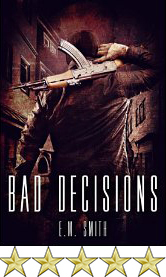 The Agent Juliet Series, a five part serial by author E.M. Smith (Amazon, Goodreads) is about an uncouth southern guy's-guy, Jamie Kendrick--kind of a fuck-up--and his traumatic induction into a black-ops unit. The series is witty, bloody, full of delightfully written adult language, and ultimately very emotionally satisfying. There are twists you won't expect and some you do--and one very big one that'll shock the hell out of you. I'll try not to give away spoilers.
The Agent Juliet Series, a five part serial by author E.M. Smith (Amazon, Goodreads) is about an uncouth southern guy's-guy, Jamie Kendrick--kind of a fuck-up--and his traumatic induction into a black-ops unit. The series is witty, bloody, full of delightfully written adult language, and ultimately very emotionally satisfying. There are twists you won't expect and some you do--and one very big one that'll shock the hell out of you. I'll try not to give away spoilers.So, I read this series in the wake of my own serial for Romance Unlimited. Sodom's Sons was my first attempt at a serial and you'll notice that it's no longer published. Writing serials effectively and maintaining a good pace is hard work! I wasn't pleased with the outcome and despite the work I put into it I re-read it near the end of the run and just didn't want it out there as it is.
I found this series because I wanted to read a good example in a different genre than I write. I dug and dug for a series that had some good reviews and ratings and looked like it was done well. I read the first book of maybe seven or eight before I stumbled upon this one, and it blew the rest out of the water. This is the first full serial series that I've read the full run of and it has really set the bar for me.
The five episode/three act structure evident in this series is masterfully done. Every book is action packed, the pace makes reading them in one sitting a breeze, and E.M. Smith's writing style is engrossing and humorous even when it's full of blood and gunfire. Jamie Kendrick, who is drawn into a conspiracy surrounding his two nieces--the only survivors of the brutal murder of Jamie's Brother and Sister-in-law, who are his only family and for whose murders he was framed--is a well-meaning anti-hero who is no where near ready to be a soldier but doesn't have a choice. He's convincingly driven by his connection to his nieces, and goes through turns of being a fiercely loving uncle, a sad, broken man, and a soldier with more courage than skill. He was excellently written and Smith crafted a solid emotional connection to his main character.
I'd like to be able to point out something you might not like about these books but honestly there was nothing I didn't like. It was succinct, no words were wasted, the editing was spot-on, all of the characters on the NOC-unit team, the nieces, their caretaker, even the main antagonist that we don't meet until the last book are all colorful, unique, and easy to imagine. If you get hung up on happy endings and have some specific idea in mind about what that means, the ending might throw you a bit--but I loved it and felt that it was exactly what it had to be for this story.
If you have Kindle Unlimited, please accept my recommendation to Borrow each book in the series rather than purchase the box-set. It'll cost you nothing but make E.M. Smith the most income and we authors do appreciate that. If you are not subscribed, there is a link below to the box set--go ahead and pick it up, you will not regret spending three bucks for this series.
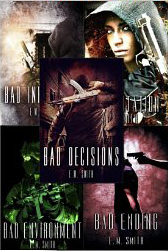 Don't have KU? Buy the box set.
Don't have KU? Buy the box set. 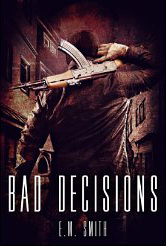 KU Subscriber? Please consider borrowing each book to support the author.
KU Subscriber? Please consider borrowing each book to support the author.
Published on May 02, 2015 19:32
Book Review: Agent Juliet Series by Author E.M. Smith
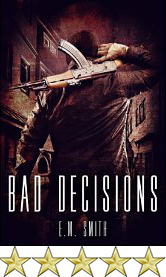 The Agent Juliet Series, a five part serial by author E.M. Smith (Amazon, Goodreads) is about an uncouth southern guy's-guy, Jamie Kendrick--kind of a fuck-up--and his traumatic induction into a black-ops unit. The series is witty, bloody, full of delightfully written adult language, and ultimately very emotionally satisfying. There are twists you won't expect and some you do--and one very big one that'll shock the hell out of you. I'll try not to give away spoilers. So, I read this series in the wake of my own serial for Romance Unlimited. Sodom's Sons was my first attempt at a serial and you'll notice that it's no longer published. Writing serials effectively and maintaining a good pace is hard work! I wasn't pleased with the outcome and despite the work I put into it I re-read it near the end of the run and just didn't want it out there as it is.
The Agent Juliet Series, a five part serial by author E.M. Smith (Amazon, Goodreads) is about an uncouth southern guy's-guy, Jamie Kendrick--kind of a fuck-up--and his traumatic induction into a black-ops unit. The series is witty, bloody, full of delightfully written adult language, and ultimately very emotionally satisfying. There are twists you won't expect and some you do--and one very big one that'll shock the hell out of you. I'll try not to give away spoilers. So, I read this series in the wake of my own serial for Romance Unlimited. Sodom's Sons was my first attempt at a serial and you'll notice that it's no longer published. Writing serials effectively and maintaining a good pace is hard work! I wasn't pleased with the outcome and despite the work I put into it I re-read it near the end of the run and just didn't want it out there as it is.I found this series because I wanted to read a good example in a different genre than I write. I dug and dug for a series that had some good reviews and ratings and looked like it was done well. I read the first book of maybe seven or eight before I stumbled upon this one, and it blew the rest out of the water. This is the first full serial series that I've read the full run of and it has really set the bar for me.
The five episode/three act structure evident in this series is masterfully done. Every book is action packed, the pace makes reading them in one sitting a breeze, and E.M. Smith's writing style is engrossing and humorous even when it's full of blood and gunfire. Jamie Kendrick, who is drawn into a conspiracy surrounding his two nieces--the only survivors of the brutal murder of Jamie's Brother and Sister-in-law, who are his only family and for whose murders he was framed--is a well-meaning anti-hero who is no where near ready to be a soldier but doesn't have a choice. He's convincingly driven by his connection to his nieces, and goes through turns of being a fiercely loving uncle, a sad, broken man, and a soldier with more courage than skill. He was excellently written and Smith crafted a solid emotional connection to his main character.
I'd like to be able to point out something you might not like about these books but honestly there was nothing I didn't like. It was succinct, no words were wasted, the editing was spot-on, all of the characters on the NOC-unit team, the nieces, their caretaker, even the main antagonist that we don't meet until the last book are all colorful, unique, and easy to imagine. If you get hung up on happy endings and have some specific idea in mind about what that means, the ending might throw you a bit--but I loved it and felt that it was exactly what it had to be for this story.
If you have Kindle Unlimited, please accept my recommendation to Borrow each book in the series rather than purchase the box-set. It'll cost you nothing but make E.M. Smith the most income and we authors do appreciate that. If you are not subscribed, there is a link below to the box set--go ahead and pick it up, you will not regret spending three bucks for this series.
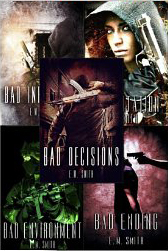 Don't have KU? Buy the box set.
Don't have KU? Buy the box set. 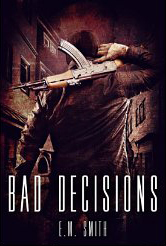 KU Subscriber? Please consider borrowing each book to support the author.
KU Subscriber? Please consider borrowing each book to support the author.
Published on May 02, 2015 12:21
April 22, 2015
Time for Gay Heroes.
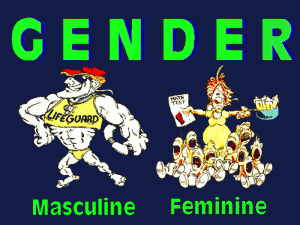 Imagine that you grew up and never once read a book with, if you're a man, a male protagonist--and if you're a woman, imagine never reading a book about a female protagonist. Better, imagine that every male hero you ever read about as a man was uber-macho, obsessed with women and sex, had a "manly" occupation, and never had an intelligent, thoughtful character trait to them.
Imagine that you grew up and never once read a book with, if you're a man, a male protagonist--and if you're a woman, imagine never reading a book about a female protagonist. Better, imagine that every male hero you ever read about as a man was uber-macho, obsessed with women and sex, had a "manly" occupation, and never had an intelligent, thoughtful character trait to them. Women, this shouldn't be too hard: imagine that every heroine you read about has to be saved by a man, is obsessed with being married and having children, her whole story takes place in a kitchen, and she's too pre-occupied with her clothing and make-up to ever get anything actually accomplished in her story. It sometimes seems like that for heroines at times, although that has thankfully taken a huge turn in the last hundred years.
This is a little what it's like reading books as a gay kid, though, and now as a gay adult. Gay characters fulfill very specific roles in literature, as martyrs, over-sexed comedic relief, best-friends with snarky lines, tragic AIDS patients... and so on. If you do get one, it's a romance and there are reliable and overdone tropes that you'll see again and again. To be fair, that's true of most genre fiction, but when it comes to reading about gay heroes, there's just nothing good out there.
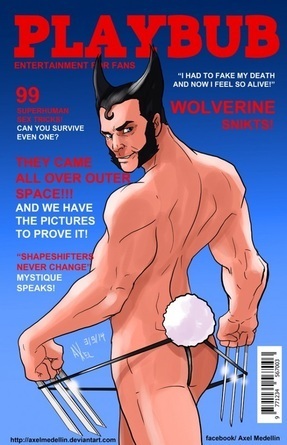 Found at Comic Book Resources, art by Axel Medellin Gay Heroes. What does that even mean? Well, let me break it down a bit for you...
Found at Comic Book Resources, art by Axel Medellin Gay Heroes. What does that even mean? Well, let me break it down a bit for you...Most of the stories that you've read featuring a gay protagonist almost certainly involved the following themes:
It's a story about a gay relationship, be that erotica or romance.The main character is a study in tragedy, either bullied, sick with HIV, or otherwise enduring the struggle of being gay.It's a coming out story, all about coming to terms with one's sexuality and then finally taking the leap into first love, or maybe dealing with the fallout (see #2).It kind of doesn't count, but the main character isn't actually gay; just has some gay friend who plays a minor supporting role.Now, with independent publishing becoming a more prominent means of getting a story out there to be read, we see more of these, but the above four points are essentially what is required to get your book published from a major publishing company if you want to write a story about a gay character. Why? Because gay "doesn't sell". For mainstream fiction, a publishing house wants to see a book that has mass market appeal and frankly while gay people will read about straight characters, a lot of straight people will not read about gay characters.
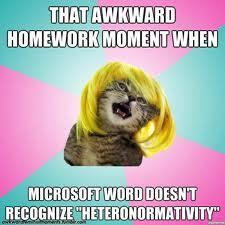 This is due to something called heteronormativity. It's the basis for our current paradigm of western cultural sexuality gender roles and it is extremely damaging to gay youth in particular and, depending on their ability to graduate from uncertain gay youth to more stable and well-adjusted gay adult, to gay people in general. We all know, understand, and accept straight relationships because they're the norm. From a young age it's what we learn about--we're told about it, it's demonstrated regularly, we read about it, see it on television, in magazines, etc. Hetero sex and relationships are all over the place. As a gay man, I know how to be a straight man because that's what I was taught my entire life.
This is due to something called heteronormativity. It's the basis for our current paradigm of western cultural sexuality gender roles and it is extremely damaging to gay youth in particular and, depending on their ability to graduate from uncertain gay youth to more stable and well-adjusted gay adult, to gay people in general. We all know, understand, and accept straight relationships because they're the norm. From a young age it's what we learn about--we're told about it, it's demonstrated regularly, we read about it, see it on television, in magazines, etc. Hetero sex and relationships are all over the place. As a gay man, I know how to be a straight man because that's what I was taught my entire life. But think about this for a second. Over the course of your life, if you're heterosexual, then you've had ample examples of healthy and unhealthy heterosexual relationships. You've seen men and women in a variety of roles relative to one another, and probably--if you were lucky--had someone sit down and explain the birds and the bees, talk about men/women and how to interact with them, and been given some general guideline on what I'll call "living straight" just for contrast (that's not a real thing, of course--that's just "living" cause heteronormativity).
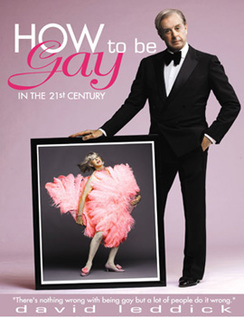 When it comes to growing up gay, you don't get any of that. You are taught how to live as a heterosexual and if you turn out to be homosexual then you're basically on your own. That's changing bit tiny bits and pieces, finally, but you still don't receive the same guidance on sex, relationships, being part of western culture, etc. You have to wing it and figure it out yourself and that can be a difficult, terrifying, and damaging journey to make without any context. The examples we're given in media are not good ones to follow most of the time. They're either caricatures or over-sexualized to the point that it's no wonder people think of homosexuals--gay men in particular--as being rampant sex hounds. Growing up gay for me, personally, was a study in how gay men have sex and not much else.
When it comes to growing up gay, you don't get any of that. You are taught how to live as a heterosexual and if you turn out to be homosexual then you're basically on your own. That's changing bit tiny bits and pieces, finally, but you still don't receive the same guidance on sex, relationships, being part of western culture, etc. You have to wing it and figure it out yourself and that can be a difficult, terrifying, and damaging journey to make without any context. The examples we're given in media are not good ones to follow most of the time. They're either caricatures or over-sexualized to the point that it's no wonder people think of homosexuals--gay men in particular--as being rampant sex hounds. Growing up gay for me, personally, was a study in how gay men have sex and not much else. It could have been different, though. If I had read about characters, seen movies and television shows, and even read comic books, in which there were gay characters who were just gay without that having to imply or mean anything special about them beyond a preference that didn't even have to be the main focus of their story... well, who knows? Because there's no such thing. Or, there wasn't when I was growing up.
There still isn't much of that. Marvel has one of the longest lists of gay characters in mainstream comic books although many of those in this particular list are alternate universe variations and very few are central characters. DC has a comparable list with the same caveat. Comic books are making a huge statement, though, even with mostly supporting gay heroes.
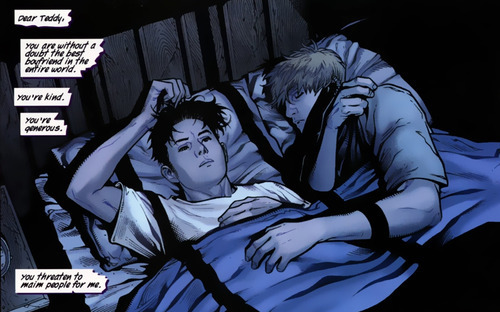 Wiccan and Hulkling, Marvel Comics. Soooooo cute! Soap box moment incoming.
Wiccan and Hulkling, Marvel Comics. Soooooo cute! Soap box moment incoming.I'm beginning to move into mainstream fiction. *Gasp!* I know, I know. I'll keep writing erotica and erotic romance, but I have plans to redirect the Adam Saint series toward a more mainstream urban fantasy, and have plans for a young adult series as well. My goal in both of these series is to write a gay character in such a way that the homosexuality isn't a hot button issue. It's not the focus of the story; the hero doesn't struggle with it directly, either. The love interest will be another man (I'll leave comparable lesbian and transgender characters to someone else for right now, but I'll tackle those roles myself if I have to) but show the variations of how we can fall in love as gay men.
Submitted to a major publisher, I would get this question: "Does the main character have to be gay? Is it critical to the story? A heterosexual protagonist will sell more books." In so many words. I'd get that for the above-mentioned reasons. The point of all of this is that a character's homosexuality does not need to be a critical part of the story. It can "just be that way" because in the real world that's what sexuality is: not a defining characteristic that sets one apart from everyone else, not picking a side on the hetero/homo fence, and not the "one thing" about you. I don't "feel" gay. I just feel like me.
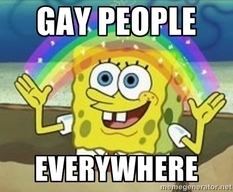 Gay people don't wake up in the morning and think gay thoughts. We don't start cooking and make gay dinners. I have not once gone through a day in which being gay was the central theme.
Gay people don't wake up in the morning and think gay thoughts. We don't start cooking and make gay dinners. I have not once gone through a day in which being gay was the central theme. Out here in the real world, cops, judges, firemen, doctors, lawyers, customer service personnel, CEOs, senators, soldiers, bums, junkies, moms, dads, brothers and sisters, hunters, heroes, criminals, and any other "character" you'll encounter can all be gay and many of them are. "Gay" doesn't need to be a type of character; there's a difference between a "gay fireman" and a "fireman who is gay" even though if you're looking through the heteronormative lens we're all fitted with from birth it will be difficult to see.
And I want gay people, gay youth in particular, to be able to see that and feel as though they have heroes, too. That they are represented and reflected in more and more ways as normal, and as accepted and looked up to--judged for their actions and accomplishments, and not their sexuality.
Not every writer can write gay characters. And not every writer should. But for those of us that can, we need a new paradigm for writing gay protagonists in fiction. It's true that gay heroes don't have mass market appeal--but there's a reason for that, and it's something that we can change.
Published on April 22, 2015 16:08
April 18, 2015
Talk about Sex: Vol. 1 - Porn, Erotica, and First-Times
As both a gay man and an erotica author, I am appropriately interested in sex. And by 'appropriately' I mean that based on my demographic, well... I have both a personal and academic interest in the subject.
This is the first of a series of posts that is one part autobiography, one part speculative socio-cultural study, and one part instruction towards being a good erotica author. I feel that as a long time practitioner of rampant promiscuity, an author of pretty darn hot erotic fiction, and long time observer of sex culture in the US, at least, I have a leg to stand on with all this. So let's get started.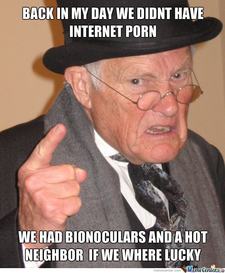 Like one hundred percent of the rest of the male population of the United States who are thirty or younger, I saw porn well before I became sexually active. I'd argue every male, except the internet kind of made access to pornography so entirely commonplace that there are bound to be men still alive who actually had sex before they ever say a picture of a naked person. Those poor bastards.
Like one hundred percent of the rest of the male population of the United States who are thirty or younger, I saw porn well before I became sexually active. I'd argue every male, except the internet kind of made access to pornography so entirely commonplace that there are bound to be men still alive who actually had sex before they ever say a picture of a naked person. Those poor bastards.
Or are they? I'm not going to bash porn here, or suggest that it has some vastly negative impact on humanity or some nonsense like that. Bad things happen to cultures where porn is highly limited or restricted in some way. I mean good lord, look at japan. Still, I have to reflect that when I entered in to my very first sexual encounter, I was a little bit... let down. Now, to be fair most everyone's first time--even before there was porn to set the bar ridiculously high--is a little disappointing. You aren't sure what to expect, and if you're lucky(?) you meet another sexually inexperienced individual and go into this exploration together, both stumbling and giggling while you explore one another's bodies and new paradigms of pleasure and satisfaction. It's pretty damned magical. Or, it can be, anyway; so I hear.
Still, I have to reflect that when I entered in to my very first sexual encounter, I was a little bit... let down. Now, to be fair most everyone's first time--even before there was porn to set the bar ridiculously high--is a little disappointing. You aren't sure what to expect, and if you're lucky(?) you meet another sexually inexperienced individual and go into this exploration together, both stumbling and giggling while you explore one another's bodies and new paradigms of pleasure and satisfaction. It's pretty damned magical. Or, it can be, anyway; so I hear.
I should admit, my 'first time' wasn't so much my 'first time' as it was my 'first mutually agreed upon full scale sex act'. By that I mean that prior to this disappointment I did actually have a friend when I was young who gifted me with oral sex because of his own curiosity--and it was awesome, but not technically a first time in the sense of all the intimacy and connection you get in the classic first-time scenario. No, my first time was almost a year after that with a man who would later turn out to be bat. shit. crazy. but was still, at that time, one of the only boys to give me a shred of attention and so, obviously, became my first boyfriend.
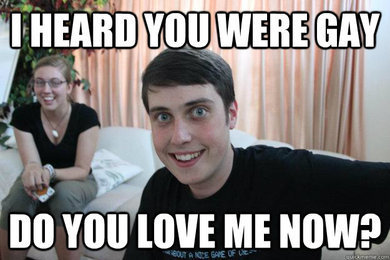
 That's a story for another time; I may actually pursue a series of "Crazy Ex-Boyfriend" posts because honey, I have stories, but for now, I digress...
That's a story for another time; I may actually pursue a series of "Crazy Ex-Boyfriend" posts because honey, I have stories, but for now, I digress...
Our sex was awkward. I expected it to be mind blowing--in very specific ways. We would trade amazing blow jobs, which would be expertly executed by each of us, and then we would have wild, howling, deep, anal sex that would leave us both sweaty and panting and spent, collapsing on one another as the camera panned out and faded to black...
Well, I didn't imagine the cameras being there--and they weren't thank the gods--but the rest of it, pretty much. I didn't think that we'd have so much trouble getting each other off, or for taking it up the ass to hurt so much (I would learn, ages later, that it probably wouldn't have if he'd bothered to use LUBE) or for me to not be able to top for him. I assumed he would be hung at least a respectable eight or nine inches, right? He wasn't super thin or muscular, but that wasn't really what I cared about. I wanted us to be able to make one another feel good, but we were both so caught up in trying to generate this artificial facsimile of sex we'd seen in pornos that we kind of lost sight of the whole part where we explore, and have fun, and let things just happen the way they happen. We were both almost imagining a director just 'off camera' telling us "Okay, now you suck him... good, good... alright, now on to the anal scene..."
In erotica, out first time scenes are often also mind-blowing. Everything goes off without a hitch, tension is high, everything is done just right, and everyone gets to eat their cookies by the end... sorry, old inside joke. You get the point.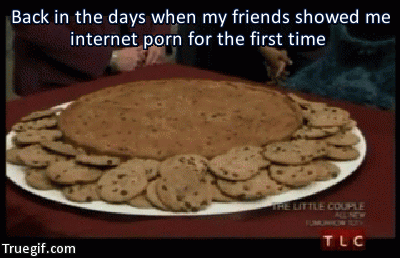
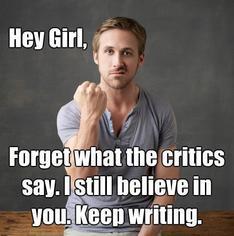 Are we doing the same thing with erotica that pornographers are doing with porn? Are we setting expectations too high? I struggle with this sometimes, I'll be honest. Lately I've spent quite a bit of time thinking about my own sexual history, and how or if it was heavily influenced by the monumental mountains of porn I've witnessed in the last, um... eighteen years or so? I started when we got AOL when I was thirteen in like 1997. It took ages. And it was all just pictures. By the time I had sex the first time when I was sixteen, things had advanced just a little bit and we were up to downloading videos over the course of ten hours for fifteen minutes of hardcore anal. Now, hell--I can get on tumblr and consume one entire day with porn if I want. I don't. I have books to write.
Are we doing the same thing with erotica that pornographers are doing with porn? Are we setting expectations too high? I struggle with this sometimes, I'll be honest. Lately I've spent quite a bit of time thinking about my own sexual history, and how or if it was heavily influenced by the monumental mountains of porn I've witnessed in the last, um... eighteen years or so? I started when we got AOL when I was thirteen in like 1997. It took ages. And it was all just pictures. By the time I had sex the first time when I was sixteen, things had advanced just a little bit and we were up to downloading videos over the course of ten hours for fifteen minutes of hardcore anal. Now, hell--I can get on tumblr and consume one entire day with porn if I want. I don't. I have books to write.
I digress. The more I thought about whether I was having a similar effect to pornography on the budding sex lives of young people (who are presumably over eighteen because their parents rightfully enacted parental controls on their computers and mobile devices until they were--right?!) the more I decided that, you know what? I don't think it's the same, and I'll tell you why.
Literature has always had one big, huge advantage over film and that is the ability to evidence an extra dimension not possible on the screen. We can show thoughts, feelings--the internal world of the 'actors' and how what they are experiencing is both interpreted by them as well as how it affects them. We can explain the import of every first-time experience, and generate real empathy with someone who has not, themselves, actually had sex before. It's nerve-wracking. It makes us wonder if we're good enough. It does blow us away, both with the physical sensation of it and, if we're exceptionally lucky, with the emotional impact of what we're exploring with someone.
And I think that's important for dealing with scenes of first-time sex in erotica. Whether it's a virgin who's never has sex as all before--or just someone experiencing their first same-sex or, hell, opposite-sex (is that a niche? Gay guys gone straight? Someone get back to me on that...) interaction. You can't write (responsibly) good first-time erotica without exploring those themes and while there are literally (hah!) great big piles of dross out there to consume these days, this is something that I feel is common to first-time stories. In a way, it could be a reflection of the sullied first-time stories many of us erotica writers have in us, changed and updated to be what we sometimes wish they had been.
My story with... we'll call him Steve (in the future, all my sex-partners shall be called 'Steve', but I will number them. So, this is Steve-1) is pretty brief and boring. Way more boring that the stuff I write, but kind of funny, too.
Steve-1 was... how to put it... kinda little. Not his body; he was taller than me, and heavier--to this day I like taller, heavier guys, in fact--but had an itty-bitty dick. I know; sad-face. No offense, those of you with itty-bitty dicks, but I'm possessed of a particularly ample backside, and you know--it takes a little depth to get in there. He had little peanut-nuts, too. Now, I was sixteen at the time, and he was nineteen. Vaguely illegal where I lived but, whatever. I hadn't learned about such a thing as micro-penis, and he could have been a late bloomer. Who knows. He also had a funny smell about him--not just during out first sexcapade, but just in general. He had a high, kind of nasally voice, and a bit of a a permanent pinch to his face that gave everyone the impression he was kind of annoyed at something all the time. Stack this on top of his wild, fast, sloppy blowjob technique--again, informed by bad pornography--and my weak jaw that couldn't last more than a few minutes before I had to stop from the cramping, and there you have a recipe for a rather disappointing sexual encounter. We didn't communicate at all, didn't make much noise--in part because his brother was home and Steve-1 wasn't out so we were ostensibly up there, you know... reading comics or something instead of attempting to be super gay. When it came time to put it in me, the only thing he did say was, "Relax... just relax... relax..." as though that would somehow open me wide and make me slick enough to let anything in.
Afterward, he told me he'd had better sex before. I KNOW, RIGHT?! So that was my first time and why I have mixed feelings about porn. And instead of being given early access to porn, I feel like young people could learn to be better lovers from good erotica. And by young people I mean those who are over eighteen, cause it's generally the law in most places and who are we kidding--no one under eighteen ever watches porn or reads erotica.
So that was my first time and why I have mixed feelings about porn. And instead of being given early access to porn, I feel like young people could learn to be better lovers from good erotica. And by young people I mean those who are over eighteen, cause it's generally the law in most places and who are we kidding--no one under eighteen ever watches porn or reads erotica.
Cheers!
This is the first of a series of posts that is one part autobiography, one part speculative socio-cultural study, and one part instruction towards being a good erotica author. I feel that as a long time practitioner of rampant promiscuity, an author of pretty darn hot erotic fiction, and long time observer of sex culture in the US, at least, I have a leg to stand on with all this. So let's get started.
 Like one hundred percent of the rest of the male population of the United States who are thirty or younger, I saw porn well before I became sexually active. I'd argue every male, except the internet kind of made access to pornography so entirely commonplace that there are bound to be men still alive who actually had sex before they ever say a picture of a naked person. Those poor bastards.
Like one hundred percent of the rest of the male population of the United States who are thirty or younger, I saw porn well before I became sexually active. I'd argue every male, except the internet kind of made access to pornography so entirely commonplace that there are bound to be men still alive who actually had sex before they ever say a picture of a naked person. Those poor bastards.Or are they? I'm not going to bash porn here, or suggest that it has some vastly negative impact on humanity or some nonsense like that. Bad things happen to cultures where porn is highly limited or restricted in some way. I mean good lord, look at japan.
 Still, I have to reflect that when I entered in to my very first sexual encounter, I was a little bit... let down. Now, to be fair most everyone's first time--even before there was porn to set the bar ridiculously high--is a little disappointing. You aren't sure what to expect, and if you're lucky(?) you meet another sexually inexperienced individual and go into this exploration together, both stumbling and giggling while you explore one another's bodies and new paradigms of pleasure and satisfaction. It's pretty damned magical. Or, it can be, anyway; so I hear.
Still, I have to reflect that when I entered in to my very first sexual encounter, I was a little bit... let down. Now, to be fair most everyone's first time--even before there was porn to set the bar ridiculously high--is a little disappointing. You aren't sure what to expect, and if you're lucky(?) you meet another sexually inexperienced individual and go into this exploration together, both stumbling and giggling while you explore one another's bodies and new paradigms of pleasure and satisfaction. It's pretty damned magical. Or, it can be, anyway; so I hear.I should admit, my 'first time' wasn't so much my 'first time' as it was my 'first mutually agreed upon full scale sex act'. By that I mean that prior to this disappointment I did actually have a friend when I was young who gifted me with oral sex because of his own curiosity--and it was awesome, but not technically a first time in the sense of all the intimacy and connection you get in the classic first-time scenario. No, my first time was almost a year after that with a man who would later turn out to be bat. shit. crazy. but was still, at that time, one of the only boys to give me a shred of attention and so, obviously, became my first boyfriend.

 That's a story for another time; I may actually pursue a series of "Crazy Ex-Boyfriend" posts because honey, I have stories, but for now, I digress...
That's a story for another time; I may actually pursue a series of "Crazy Ex-Boyfriend" posts because honey, I have stories, but for now, I digress...Our sex was awkward. I expected it to be mind blowing--in very specific ways. We would trade amazing blow jobs, which would be expertly executed by each of us, and then we would have wild, howling, deep, anal sex that would leave us both sweaty and panting and spent, collapsing on one another as the camera panned out and faded to black...
Well, I didn't imagine the cameras being there--and they weren't thank the gods--but the rest of it, pretty much. I didn't think that we'd have so much trouble getting each other off, or for taking it up the ass to hurt so much (I would learn, ages later, that it probably wouldn't have if he'd bothered to use LUBE) or for me to not be able to top for him. I assumed he would be hung at least a respectable eight or nine inches, right? He wasn't super thin or muscular, but that wasn't really what I cared about. I wanted us to be able to make one another feel good, but we were both so caught up in trying to generate this artificial facsimile of sex we'd seen in pornos that we kind of lost sight of the whole part where we explore, and have fun, and let things just happen the way they happen. We were both almost imagining a director just 'off camera' telling us "Okay, now you suck him... good, good... alright, now on to the anal scene..."
In erotica, out first time scenes are often also mind-blowing. Everything goes off without a hitch, tension is high, everything is done just right, and everyone gets to eat their cookies by the end... sorry, old inside joke. You get the point.

 Are we doing the same thing with erotica that pornographers are doing with porn? Are we setting expectations too high? I struggle with this sometimes, I'll be honest. Lately I've spent quite a bit of time thinking about my own sexual history, and how or if it was heavily influenced by the monumental mountains of porn I've witnessed in the last, um... eighteen years or so? I started when we got AOL when I was thirteen in like 1997. It took ages. And it was all just pictures. By the time I had sex the first time when I was sixteen, things had advanced just a little bit and we were up to downloading videos over the course of ten hours for fifteen minutes of hardcore anal. Now, hell--I can get on tumblr and consume one entire day with porn if I want. I don't. I have books to write.
Are we doing the same thing with erotica that pornographers are doing with porn? Are we setting expectations too high? I struggle with this sometimes, I'll be honest. Lately I've spent quite a bit of time thinking about my own sexual history, and how or if it was heavily influenced by the monumental mountains of porn I've witnessed in the last, um... eighteen years or so? I started when we got AOL when I was thirteen in like 1997. It took ages. And it was all just pictures. By the time I had sex the first time when I was sixteen, things had advanced just a little bit and we were up to downloading videos over the course of ten hours for fifteen minutes of hardcore anal. Now, hell--I can get on tumblr and consume one entire day with porn if I want. I don't. I have books to write. I digress. The more I thought about whether I was having a similar effect to pornography on the budding sex lives of young people (who are presumably over eighteen because their parents rightfully enacted parental controls on their computers and mobile devices until they were--right?!) the more I decided that, you know what? I don't think it's the same, and I'll tell you why.
Literature has always had one big, huge advantage over film and that is the ability to evidence an extra dimension not possible on the screen. We can show thoughts, feelings--the internal world of the 'actors' and how what they are experiencing is both interpreted by them as well as how it affects them. We can explain the import of every first-time experience, and generate real empathy with someone who has not, themselves, actually had sex before. It's nerve-wracking. It makes us wonder if we're good enough. It does blow us away, both with the physical sensation of it and, if we're exceptionally lucky, with the emotional impact of what we're exploring with someone.
And I think that's important for dealing with scenes of first-time sex in erotica. Whether it's a virgin who's never has sex as all before--or just someone experiencing their first same-sex or, hell, opposite-sex (is that a niche? Gay guys gone straight? Someone get back to me on that...) interaction. You can't write (responsibly) good first-time erotica without exploring those themes and while there are literally (hah!) great big piles of dross out there to consume these days, this is something that I feel is common to first-time stories. In a way, it could be a reflection of the sullied first-time stories many of us erotica writers have in us, changed and updated to be what we sometimes wish they had been.
My story with... we'll call him Steve (in the future, all my sex-partners shall be called 'Steve', but I will number them. So, this is Steve-1) is pretty brief and boring. Way more boring that the stuff I write, but kind of funny, too.
Steve-1 was... how to put it... kinda little. Not his body; he was taller than me, and heavier--to this day I like taller, heavier guys, in fact--but had an itty-bitty dick. I know; sad-face. No offense, those of you with itty-bitty dicks, but I'm possessed of a particularly ample backside, and you know--it takes a little depth to get in there. He had little peanut-nuts, too. Now, I was sixteen at the time, and he was nineteen. Vaguely illegal where I lived but, whatever. I hadn't learned about such a thing as micro-penis, and he could have been a late bloomer. Who knows. He also had a funny smell about him--not just during out first sexcapade, but just in general. He had a high, kind of nasally voice, and a bit of a a permanent pinch to his face that gave everyone the impression he was kind of annoyed at something all the time. Stack this on top of his wild, fast, sloppy blowjob technique--again, informed by bad pornography--and my weak jaw that couldn't last more than a few minutes before I had to stop from the cramping, and there you have a recipe for a rather disappointing sexual encounter. We didn't communicate at all, didn't make much noise--in part because his brother was home and Steve-1 wasn't out so we were ostensibly up there, you know... reading comics or something instead of attempting to be super gay. When it came time to put it in me, the only thing he did say was, "Relax... just relax... relax..." as though that would somehow open me wide and make me slick enough to let anything in.
Afterward, he told me he'd had better sex before. I KNOW, RIGHT?!
 So that was my first time and why I have mixed feelings about porn. And instead of being given early access to porn, I feel like young people could learn to be better lovers from good erotica. And by young people I mean those who are over eighteen, cause it's generally the law in most places and who are we kidding--no one under eighteen ever watches porn or reads erotica.
So that was my first time and why I have mixed feelings about porn. And instead of being given early access to porn, I feel like young people could learn to be better lovers from good erotica. And by young people I mean those who are over eighteen, cause it's generally the law in most places and who are we kidding--no one under eighteen ever watches porn or reads erotica. Cheers!
Published on April 18, 2015 10:46



